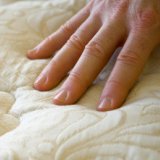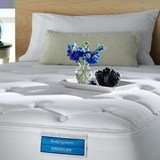Memory Foam Mattress Topper Review
This memory foam mattress topper review will cover important aspects of memory foam toppers that are key to finding just the right one for you.
We've even included several customer reviews and comments so you can see at a glance how they feel about memory foam toppers. Reviews from people who have purchased and used a product are priceless to the shopping process because they offer first-hand knowledge that can't be found in any store or on any website.
Memory Foam Mattress Topper Review - What to Consider
Do you prefer a firmer or softer mattress? Do you like the memory foam to hold its shape when you move, or do you like mattresses that re-adjust when you shift position? Depending on your preference, your answer to these questions will determine how dense and how thick your memory foam topper will be.
Memory Foam Topper Density
The density of memory foam is denoted in pounds per cubic feet. Toppers made from memory foam come in different densities: 3 pound, 4 pound or 5 pound densities. The lower density foams provide some support and will naturally be less expensive than the higher density foams.
The 4-pound foam toppers are softer and more supportive than the 3-pound toppers, whereas the 5-pound toppers tend to feel stiffer and firm compared to the other two.
The higher the density of the memory foam topper, the slower the recovery time. In other words, the 5-pound density toppers take more time to re-adjust to the body every time you move. The lower density foams react more quickly when you move around during the night.
Memory Foam Topper Thickness
What thickness of memory foam topper should you choose? The thickness of these types of mattress toppers ranges from 1-inch to 5-inch. The basic guideline in terms of thickness is the more support you want or need, the thicker the topper should be.
Memory Foam Toppers - Purchase a
Cover or Not?
Thin toppers can easily fit on top of the mattress and under the sheets, but thicker mattress toppers may require a separate cover. Here are some things customers liked and didn't like about the covers.
Benefits of Purchasing a Cover
- It's a barrier between the memory foam and skin, which could potentially prevent an allergic reaction or skin rash for people who are highly sensitive
- Protects the topper from any food or drink spills or other stains that might occur
- Increases the lifespan of the topper - saves money
- Machine washable
Drawbacks of Purchasing a Cover
- Additional cost
- Can be tricky to find one that isn't too thin or too thick
- Must remove to wash
- Causes the topper to slide around on the mattress
Allergy sufferers should look specifically for a mattress topper cover that keeps out bacteria and dust mites. One brand that consumers seem to like a lot is the Premium Protect-A-Bed cover because it protects from allergens, is made from a breathable material, and is very quiet when you're moving around.
Read on to see what customers who purchased memory foam toppers see as the best and worst features of this type of mattress pad.
Memory Foam Mattress Topper Review - Positive Customer Comments
- Excellent relief from back and neck pain since we got a memory foam topper
- Don't feel the movements of my spouse nearly as much now
- Enjoying relief from my fibromyalgia pain - hips and neck feel so much better in the morning
- Sleeping more soundly now
- Made our bed feel like new again
- Arthritis pain has subsided significantly
- Much less expensive than a new mattress
- No more tingling in my hands and arms during the night!
- Like the terry cloth cover for the pad - makes it feel more plush
- Perfect for my college dorm bed - made it bearable!
- Very cozy
Memory Foam Mattress Topper Review - Negative Customer Comments
- We find it difficult to move around freely on our 5-pound density topper
- Off-gassing - horrible chemical smell
- Too soft, too hard, not enough support
- Too hot to sleep on - makes me feel sweaty all night
- Not very durable - ours began to sag after 3 years or so
- Don't like the difficulty of cleaning the topper
- Began seeing depressions in the topper after only a few months
- Difficult to get out of the box with just one person
Memory Foam Mattress Topper Review - Pricing
How much can you expect to pay for a memory foam topper? Prices range from $38 - $220. The lower price points are for lower density, thinner toppers and the opposite is also true. Higher density, thicker memory foam toppers will cost more.
Caution About Memory Foam
Some people react adversely to memory foam, whether it's a mattress or a topper. Reactions can include difficulty breathing, skin rashes or irritations, headaches, nausea, and more.
Memory foam contains polyurethane, which is a petroleum-derived product. There are VOCs, or volatile organic compounds, in every memory foam mattress. The VOCs are what make the mattress smell like chemicals. Every mattress manufactured from synthetic materials must be, by law, treated with flame-retardant chemicals, which includes memory foam products.
These are serious considerations for anyone who is very sensitive to smell, chemicals, or simply have a fear of what years of sleeping on memory foam could do to your health down the road.
Let's All Sleep Better
Help us to spread the word!
Simply copy and paste this code into your Facebook page or blog. Thank you for sharing!
Foam Mattress Memory Sale Toppers
Memory Foam Mattress Topper Review



New! Comments
Share your thoughts about what you just read! Leave me a comment in the box below.